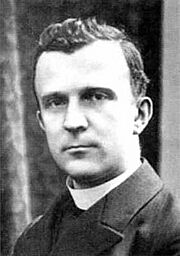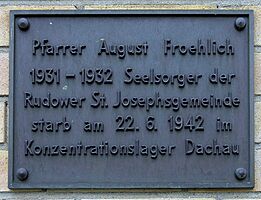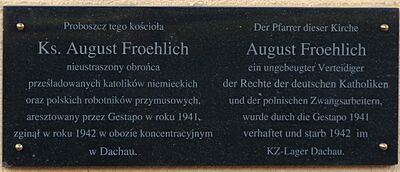August Froehlich facts for kids
August Froehlich (born January 26, 1891 – died June 22, 1942) was a Catholic priest from a region called Upper Silesia. He bravely stood up against the Nazi Party during his time as a priest. He also spoke out for German Catholics and for Polish people who were forced to work. Sadly, he died in the Dachau concentration camp, a very harsh prison.
Contents
Biography
August Froehlich was born in 1891 in a town called Königshütte (now Chorzów). His family was well-off and had a business in Upper Silesia. He was one of six children. His father owned a large mill and was a leader in a local bank.
In 1912, August started studying to become a priest in Breslau. But then World War I began, and he had to join the army. He served in a special guard unit. On July 3, 1915, he was badly hurt on the Russian front. People thought he was dead, but he was found alive the next day! After he got better, he served in France. He even received important medals like the Iron Cross. He was wounded again and became a prisoner of war.
He returned home in 1920, two years after the war ended. He went back to his studies at the Breslau University. On June 19, 1921, August Froehlich became a priest. He then moved to Berlin and also worked in Pomerania.
Standing Up to the Nazis
In Berlin, August Froehlich saw how hard life was after the war. There was a lot of poverty. He used his own money to help poor families. He also helped share Catholic newspapers. These papers offered different ideas than the Nazi Party's news.
Father Froehlich quietly showed his opposition to the Nazis. For example, in 1935, he refused to collect money for the Nazi government. He wanted to use his money for his own charity work instead. This made a local Nazi leader very angry.
He also refused to use the Nazi greeting, Heil Hitler. Instead, he encouraged people to use the traditional greeting, Grüß Gott, which means "praised be God." He even wrote a letter explaining why he used this greeting:
The greeting "Praise God" is an old German greeting for all Christians. It is like "Praise Jesus Christ" for Catholics. ...You told me not to make church announcements after Sunday Mass because you said people would feel pressured. I ask that you also avoid pressuring people to accept your political ideas. Political and religious ideas should be accepted because people believe in them, not because of pressure. Our leader promised freedom of religion for Catholics. So, I am proud to wear my priest's uniform and use a Catholic greeting, just as you use your uniform and greeting. I am just as brave to show my uniform and greeting as I believe you are with yours.
From 1937 to 1942, Father Froehlich was a parish priest in Rathenow. Many Polish people were forced to work there in a company that made optical weapons. These Polish Catholics were not allowed to attend German church services. So, Father Froehlich held separate Sunday Masses just for them.
He also heard about the bad treatment of these Polish workers. He bravely spoke about it publicly during church announcements. He even contacted the company management. He did not know that one of their human resources officers was a Nazi leader who had sent his own Jewish brother to a concentration camp.
Arrest and Death
Because of his actions, the Nazi authorities arrested him. On July 28, 1941, he was sent to a concentration camp. Over eleven months, he was held in three different camps: Buchenwald, Ravensbrück, and finally, Dachau. He died in Dachau on June 22, 1942, because of the terrible conditions there.
Education
August started studying Philosophy in 1912. He had to stop because of World War I, but he was able to finish his studies later.
See also
- Priest Barracks of Dachau Concentration Camp
Memory
- A special plaque in a crypt of St. Hedwig's Cathedral in Berlin remembers him.
- Another plaque is in the church of St. Josef in Berlin-Rudow.
- There is also a plaque in the church of St. Paul in Drawsko Pomorskie.
- A street in Berlin-Rudow is named August-Froehlich-Straße after him.
- Another street in Rathenow is named Pfarrer-Froehlich-Straße (Father Froehlich Street).
Images for kids







